Overview Link to this section

We each develop at our own pace, so it's impossible to tell exactly when a particular student will reach a specific milestone or learn a given skill. The developmental milestones below will give you a general idea of the changes you can expect as each six and seven-year-old gets older, but don't be alarmed as each student takes a slightly different course. Honor where they are and support them as they develop.
Physical Development

- More aware of their fingers as tools; can use their fingers to count on, trace a maze, maneuver electronic devices, balance a scale, pour exact amounts
- Noisy, sloppy, and in a hurry; fingers are sometimes clumsy and tasks need slowing down or repeated practice to achieve desired results
- May fall backward out of their chairs at this age rather than sideways
- Children at this age are teething, so they often chew on pencils, fingernails, hair, books, and other objects
- Work in spurts and will tire easily
- Enjoy being active, both inside and outdoors
- Good visual tracking from left to right and back to the beginning of the next line is normative as sixes begin to read
- Some will still have difficulty copying from board or chart; provide handouts for students to copy from at their desks
- When writing, find spacing and staying on the line difficult because they are more interested in process than product
- Often more comfortable standing up to work, even at their desks
Social & Emotional Development
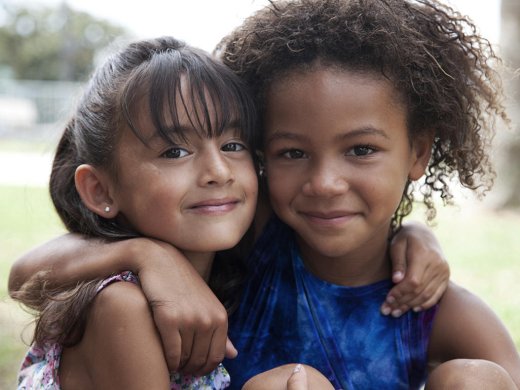
- Ambitious; may choose projects that are too hard
- Proud of their accomplishments and highly competitive
- Sometimes "poor sports" or dishonest; may invent new rules so they can win; cooperative challenge activities take the edge off their fierce need to win individually
- Anxious to do well; extremely sensitive; severe criticism can truly be traumatic
- Tremendous capacity for enjoyment
- Can be bossy, teasing, or critical of others; bossy behavior is sometimes related to competition for friendships
- Tend to complain frequently and use tantrums, teasing, bossing, complaining, and reporting on classmates to try out relationships with authority; need adult understanding but also clear boundaries and limits for acceptable behavior; it can be helpful to read books about teasing, etc.
- Care a great deal about friends; may have a best friend
- Sometimes more influenced by happenings at school than at home
- Enjoy working and playing in groups; engage in more elaborate cooperative and dramatic play
- Like doing things for themselves; ready to try taking on individual and group responsibility
Communication & Language
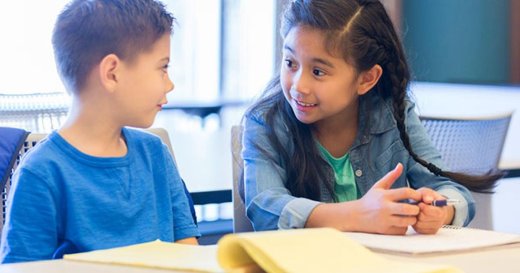
- Enjoy explaining things and sharing about things they like; partner sharing can serve as a helpful rehearsal before sharing with the class
- Use boisterous and enthusiastic language
- Love jokes and guessing games that the whole class can engage in; a fun activity is trying to guess a number by asking questions and explaining how they "got" the number before saying the answer
Cognitive Development
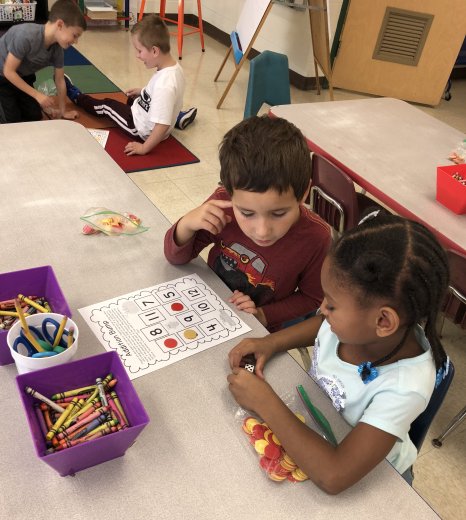
- Very curious; love discovery, new ideas, and asking questions
- Better understanding of past and present, long ago and far away; can begin to understand real history markers
- Very motivated to learn; enjoy the process more than the product; beginning to value skill and technique for their own sake
- Love to color, paint, read, and write; experience an artistic explosion; learn the most when teachers value their efforts and encourage risk-taking
- Comfortable with a busy level of noise and activity
- Enjoy and learn from games, poems, riddles, and songs
- Proudly produce a great quantity of work but are unconcerned with quality; can produce products of higher quality when encouraged to work more slowly or when teachers limit the number of complexity of tasks
- Enjoy and learn from field trips followed by opportunities to tell about trips or use blocks to recreate things they saw
Reading, Writing, & Across The Curriculum
Reading - Provide opportunities for children this age to:
-
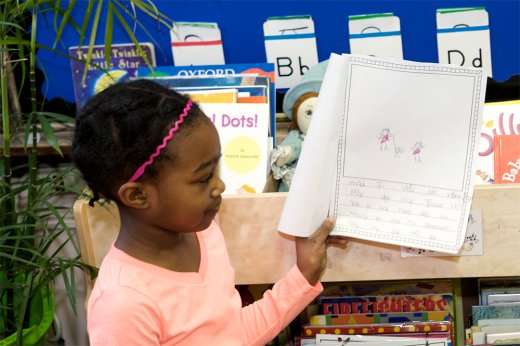
- Continue targeted phonics learning
- Continue reading decodable texts and predictable texts while beginning to move on to easy chapter books
- Use writing, drawing, clay, painting, drama, or blocks to show their thoughts and feelings about a story
- Show their understanding of differences between genres (for example poetry versus a report; fiction versus nonfiction)
Writing - Expect from children this age:
- Writing: Story development still strongly influenced by drawing, for example, stories based on a collection of drawings; writing whole sentences that are early phonemic or use "letter name" spelling strategies -- "I WNT TO HR HS" for "I went to her house"
- Beginning Spelling: Letter naming and "transitional" spelling ("My frends ride bikes"); emerging sense of phonetic clues
- Writing Themes: Best friends, school-related stories, family, pets, going on trips, new possessions, holidays, fantasy
- Handwriting: Proper grasp of pencil; letters the same size or slightly larger than at five and more sloppily written because children are rushing and experimenting with new letter formation; spontaneous mixing of uppercase and lowercase letters; unpredictable spacing
Across the Curriculum - Provide opportunities for children this age to:
- Take short wiggle breaks throughout the day
- Have a range of choices with different degrees of difficulty for working on classroom projects and representing learning
- Enjoy surprises and treats, including learning new games, inventing new characters, drawing treasure maps
- Use new tools such as magnifying glasses or field journals to draw in
- Make and use maps of the classroom, their room at home, or their route from home to school
- Practice newly learned techniques; for example, to help them understand how scientists observe and measure growth over time, they might draw pictures of a seed they plant in the classroom and draw its growth each day
- experiment with clay, paint, dancing, coloring, bookmaking, weaving, singing, and other arts
Seven
Link to this section
Physical Development
-
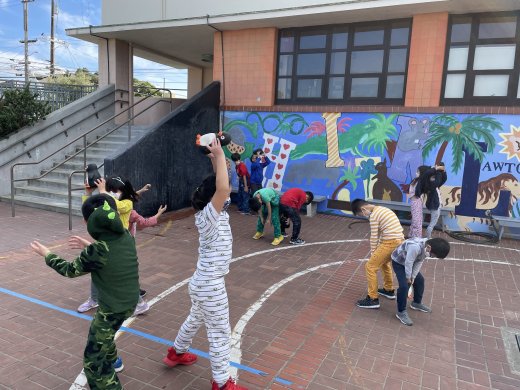
- Improved coordination for both gross and fine motor skills
- More coordinated with throwing, catching, and other foundational movement skills than at younger ages
- Muscles sometimes are tense; they often hold pencil near the point with a three-fingered, pencil-like grasp that they find difficult to relax
- Anchor their printing and drawing to the baseline; find filling up the line space difficult
- Increased ability to focus on objects nearby; often focus on a small, close area; writing, drawing, and numbers are tidy and small, if not microscopic
- Work with head down on the desk, often covering or closing one eye
- Can be sensitive to many physical and psychosomatic hurts
- Often prefer video or online games to physical activity, though still enjoy imaginary adventures outdoors
Social & Emotional Development
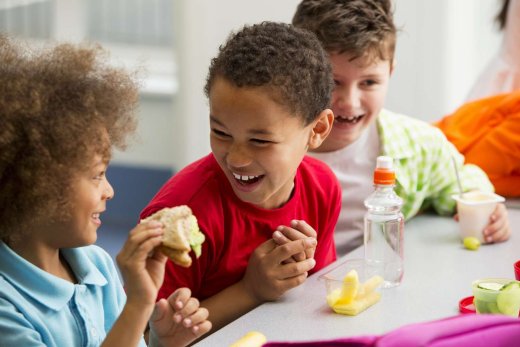
- Inward-looking; sensitive to others' feelings; empathetic
- Often have a best friend, although their best friend might frequently change
- Prefer working and playing alone or with one friend; enjoy one-on-one conversations and like to send notes
- Changeable; sometimes moody or potty; may worry that "Nobody likes me!"
- Needs security, structure, and stability; can be upset by changes in room arrangement or scheduling
- Will rely on adults for help and constant reassurance
- Extremely loyal to the classroom teacher; need teachers to prepare them in advance for substitutes
- Conscientious and serious about their school work for the most part; don't like taking risks or making mistakes; can get sick from worrying about tests, assignments, etc
- Have strong likes and dislikes
- Demonstrate a desire to keep things new and tidy
- Playground games such as jump rope, foursquare, and hop-scotch are more popular than team or large-group activities, although imaginary play remains strong
- Having a strong sense of right and wrong, and concern for others leads them to sometimes tell students about classmates' behaviors
Communication & Language
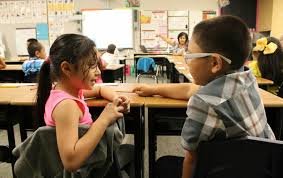
- Listen as well and speak precisely
- Rapidly develop their vocabularies; sevens love to keep notebooks of their new words
- Shows great interest in the meanings of words
- Secret codes, Morse code, and similar language play can engage children at this age
Cognitive Development

- Like to repeat tasks; like to review learning verbally or frequently touch base in other ways with their teacher
- Weekly spelling and vocabulary lists and short tests are enjoyable for students
- Like to work slowly and finish what they start; appreciate a "heads-up" that it's time to prepare for transitions; may find timed tests especially troublesome
- Bothered by mistakes and try hard to make their work perfect
- Enjoy inquiry activities and hands-on exploration, often work well in "discovery" centers
- Like to collect, sort, and classify
- Still like to be read chapter books by teachers and parents
- Enjoy board games as well as computer games; especially enjoy playing games with one other person
- Increasingly able to share what they are learning and how they feel about it through verbal, written, and artistic reflections
- Need support for sustained, quiet work periods
- Enjoy memorization of poems, songs, chants, and cheers
- Comfortable with emphasis on high-quality products and proper display of work; able to accept feedback and revise work
- A few students are still not fully able to read without vocalizing; still sometimes whisper to themselves during "silent" reading
Reading, Writing, & Across The Curriculum
Reading - Provide opportunities for children this age to:

- Have time for individual reading
- Continue phonics work; children thrive on intense phonics instruction in small groups
- Do written reading comprehension assignments that are short and pithy; better to have students complete two or three questions thoroughly than answer many test-like comprehension practice sheets
Writing - Expect from children this age:
- Writing: Longer stories with a beginning, middle, and end, including "chapter" books in some cases; great interest in the story line; tendency to include lots of detail; writing before drawing and sometimes even writing without drawing; readiness to begin nonfiction writing as a way to show learning from science or social studies investigations
- Spelling: Correct spelling slowly emerging from transitional spelling; increased phonetic and sight word fluency; ease in learning capitalization and punctuation; readiness for formal spelling program
- Writing Themes: Family and friends; sleeping over; losing teeth; pets (often including stories about the death of a pet); nightmares; worries about the death of family members, illness, war, famine, or other serious issues
- Handwriting: Letters are often microscopic in size
Across the Curriculum - Provide opportunities for children this age to:
- Use digital tools such as SeeSaw to show what they have learned
- With support, take photos to incorporate into reports or class books
- Have choices in how they represent their learning
- Take things apart and discover how they work; sort and classify things like buttons, pictures, leaves, shapes
- Expand vocabulary in all subject areas
- Play games and tell jokes as a way to moderate their seriousness
- Work with one partner rather than just groups
Credit Link to this section
This content on development comes from Yardsticks: Child & Adolescent Development by Chip Wood and has been lightly adapted to better reflect the language usage and practices of SFUSD.
This page was last updated on November 8, 2023

